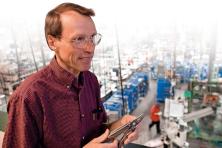Yesterday was a momentous day for Oregon moving one step closer to a low carbon economy. The Senate Environment and Natural Resources Committee, chaired by Senator Chris Edwards from Junction City, voted to move Senate Bill 324, the measure to lift the sunset on Oregon’s Clean Fuels Program, out of committee and on to the Senate floor for a vote.
Many business leaders and organizations from around the region testified on the Bill, in favor of implementing the program which will lower the carbon intensity of transportation fuels 10 percent over 10 years.
Add your voice: Ask your state representative to support Oregon's Clean Fuels Program.
Climate Solutions offers you this roundup of what our leaders submitted in both written and spoken testimony. Check out the range of reasons why this program will benefit all Oregonians: bringing more investment dollars to the state, expanding job opportunities, cleaning the air we breathe, and combatting the risks of global warming. Many thanks to all who have participated, and those who will continue to advocate for this bill to pass through the Senate and House, and on to the Governor’s desk for final implementation.
Margaret Puckette, program manager from Shorepower Technologies, gave testimony about why this Hillsboro-based company helps truckers stay comfortable at truck stops, while reducing idling. This technology puts electricity into cabs to make coffee, watch television, or provide heating and cooling – while preventing idling. In turn, the technology eliminates noise at rest stops, offers cleaner air by eliminating tailpipe emissions, and displaces thousands of gallons of diesel fuel. Plus, truckers save thousands of dollars by plugging in. It is a great local company, providing added value to truckers, all while reducing carbon pollution.
Thank you Margaret and Shorepower Technologies for bringing clean fuels solutions to Oregon, and to truckers across the USA!
Tom Koehler, a 5th generation Oregonian, and co-founder of Pacific Ethanol, gave testimony in favor of the clean fuels program, offering that it would spur his company to increase its investment in Oregon, bringing more revenue and jobs to the state. Tom served on the business advisory committee which reviewed the Clean Fuels Program, a committee which concluded unanimously to support the low carbon fuel standard, and lift the sunset to fully implement the program. The advisory committee recognizes the program is the right thing to do for Oregon because it:
- Takes carbon out of transportation.
- Is performance based.
- Creates competition in the marketplace.
- Spurs innovation and jobs in the economy.
- It’s the right thing to do!
Many thanks to Tom and Pacific Ethanol for all of their efforts on implementing a strong program for Oregon’s economy and environment. Here is a roundup of other written testimony from diverse stakeholders in support of implementing the Clean Fuels Program:
Ryan Deckert, President - Oregon Business Association: “Oregon sends more than $6 billion out of state each year importing gas and diesel fuel, money that by and large doesn’t benefit our state economy. Our over-reliance on petroleum leaves us vulnerable to inevitable price increases and price spikes that hinder our economic recovery.
“Diversifying our fuel supply with clean fuels, some of which are from renewable sources will stabilize our already volatile fuel prices and pave the way to a smoother economic recovery through increased economic development in the clean fuels industry. A diversified fuel supply also protects us from price spikes, keeps costs down over time and allows us to move goods more cheaply.”
Carrie Nyssen, VP of Advocacy and Air Quality at the American Lung Association of the Mountain Pacific: “When we look at the cost of unhealthy fuels – we need to consider the health benefits of implementing policies we know will improve our air quality and improve the quality of life of those affected by lung disease and create healthier communities. We know that there is a cost – a hidden dirty fuel tax – every additional day we remain addicted to unhealthy fossil fuels.
"Cleaner fuels are vital to reduce smog and soot pollution; cleaner fuels can directly reduce common health problems caused by toxic air pollution, like asthma, cancer and COPD. The transition to clean fuels and clean transportation technologies is a win-win – it’s a win for climate and a win for our lung health and public health.”
Rita Hansen, CEO - Onboard Dynamics, Inc: “Onboard Dynamics founded our company here in Bend with the concept that we could make it easier for the average Oregonian to choose a cleaner and more affordable fuel. We believed it was possible to move beyond traditional barriers. In partnership with OSU, state and federal agencies, and other businesses, we are developing innovative technologies that will initially target fleets, enabling them to refuel their vehicles with cleaner burning and less costly natural gas right at their business locations.
“We’re proud of the work we’re doing but we recognize that we are only one part of the solution. Businesses will always innovate, but we need the state to do its part and take the next steps. With consistent and supportive policy from Oregon, businesses can continue to invest in development, production, and infrastructure to support Oregonians’ fuel choice, build out a clean energy economy with local jobs, and support cleaner air for us all.”
Mike Dewey - Waste Management: “Waste Management (WM) supports SB 324. In Oregon, the company provides solid waste residential and business collection services, operates two transfer stations in the Metro region, has a vibrant recycling program including advanced material recovery of dry waste, and operates two subtitle D solid waste landfills.
“In the future, with enactment of SB 324, the company through incentives may invest in new facilities to fuel vehicles pertaining to the operations of the landfills. Without a clean fuels program such investments do not pencil out.”
Ed and Jodee King - King Estate Winery: “King Estate has worked to be a responsible steward of the land. We believe our transportation fuel provides, whom we work with, should also be responsible stewards and do their fair share to make cleaner fuels available.”
Robin Wisdom and Claudia Keith, League of Women Voters of Oregon: “Oregon has an opportunity to take advantage of West Coast regional opportunities. California and British Columbia already have successful clean fuel programs in place as part of thriving clean economies. Washington is poised to move ahead with a program of its own. Oregon should be part of the developing West Coast clean fuels corridor. If we remain on the sidelines, opportunities and investments will pass us by.”
Alex Wall - Environmental Entrepreneurs (E2): “Because Oregon has no in-state refining capacity, the Clean Fuels Program provides only economic upside to Oregonians. The program encourages local fuels production, and according to Jack Faucett Associates, will create up to 29,000 jobs. My group studies investments in the clean fuels market, and estimates that $4 billion in private funding has been invested into the sector’s most advanced fuels. Some of this investment should be coming to Oregon, but it only will if there is an appropriate, predictable price signal in place as provided by the Clean Fuels Program.”
Jason Franklin, AICP, President - American Planning Association, Oregon Chapter: “The Clean Fuels Program helps implement Oregon’s adopted Statewide Transportation Strategy, produced by the Oregon Department of Transportation (ODOT) with the Department of Land Conservation and Development (DLCD) and many community partners. It also implements our state’s Oregon Global Warming Commission Roadmap to 2020 to address Climate Change in Oregon and is an essential tool in our box as we work together to reach our climate reduction goals.”




